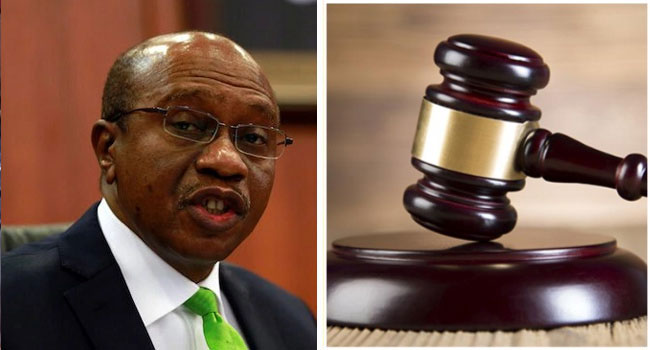A decisive ruling Wednesday at the Lagos State Special Offences Court in Ikeja has kept former Central Bank of Nigeria (CBN) Governor Godwin Emefiele’s corruption trial on track despite defense attempts to reset proceedings with a new judge.
Justice Rahman Oshodi rejected a recusal application from Emefiele’s legal team, finding no merit in their allegations of judicial bias and ensuring the high-profile case will continue under his oversight.
The ruling represents a significant victory for prosecutors at the Economic and Financial Crimes Commission (EFCC), who have vigorously pursued charges against the former central bank chief since his removal from office.
During Wednesday’s proceedings, Justice Oshodi methodically dismantled the defense’s arguments while affirming his impartiality in handling the sensitive case that has captivated Nigeria’s financial and political circles.
The claims of bias have not been substantiated by either of the defendants. Accordingly, the first and second defendants’ recusal application is refused,” Justice Oshodi declared in his ruling.
The failed recusal attempt marks the latest development in what has become one of Nigeria’s most closely watched corruption prosecutions, involving a figure who once controlled Africa’s largest economy’s monetary policy.
The defense strategy emerged Monday when Emefiele’s counsel, Olalekan Ojo, made an oral application requesting Justice Oshodi remove himself from the case. Ojo argued that previous rulings indicated a potential bias against his client, suggesting the proceedings could not continue fairly under the current judge.
EFCC prosecutor Rotimi Oyedepo forcefully countered these claims, maintaining that the court had conducted the trial with complete fairness and equity. Oyedepo characterized the recusal request as a tactical maneuver to delay the proceedings rather than a legitimate concern about judicial impartiality.
After carefully considering arguments from both sides and reviewing relevant legal precedents, Justice Oshodi concluded the defense had failed to present convincing evidence supporting their bias allegations.
Legal experts observing the case note that successful recusal applications typically require substantial proof of prejudice or impropriety – a high threshold the defense apparently failed to meet.
Emefiele’s tenure as CBN Governor ended in controversy after a distinguished career that saw him implement numerous monetary policies aimed at stabilizing Nigeria’s economy. His management approach at the apex bank included controversial foreign exchange policies and attempts to redesign the naira, which generated significant public debate.
The former CBN chief’s legal troubles began shortly after his removal, with investigations focusing on allegations of financial impropriety during his administration of the central bank. The EFCC has pursued the case aggressively, viewing it as emblematic of their broader anti-corruption mandate.
Wednesday’s ruling ensures the trial will continue on its established timeline, allowing prosecutors to present their evidence without the delay a judicial change would have necessitated. For the defense, the failed recusal bid means they must now refocus on challenging the substantive allegations rather than procedural matters.
The case has drawn significant attention from Nigeria’s business community and international financial observers, who see it as a test of the country’s commitment to accountability in public office. Financial markets have watched proceedings closely, as the outcome could influence perceptions about governance standards in Nigeria’s economic institutions.
Court analysts suggest the defense may have calculated that a new judge would require time to familiarize themselves with the complex case file, potentially creating opportunities for a fresh approach to key evidentiary rulings. The failure of this strategy leaves Emefiele’s team facing an unchanged judicial perspective on the evidence presented thus far.
Justice Oshodi’s reputation for thoroughness and strict adherence to procedural standards has characterized the trial from its beginning. His comprehensive ruling on the recusal application further demonstrates his methodical approach to the complex legal questions the case presents.
For ordinary Nigerians, the trial represents more than a legal proceeding against a former official – it symbolizes the functioning of accountability systems within their democracy. Many citizens have expressed frustration with corruption in public office and view high-profile prosecutions as essential to establishing consequences for misconduct.
The prosecution team, bolstered by Wednesday’s favorable ruling, is expected to continue presenting evidence supporting their allegations against the former CBN Governor. Court observers anticipate increasing focus on the substantive charges as procedural objections have now been largely addressed.
As the case proceeds, financial analysts will continue monitoring for potential implications regarding central bank governance and independence. The proceedings may ultimately influence policy discussions about oversight mechanisms for Nigeria’s financial regulatory institutions.
The trial resumes with Emefiele’s defense team now challenged to develop alternative strategies as they continue representing the former central bank chief against the serious allegations that could permanently damage his previously distinguished reputation in financial circles.



